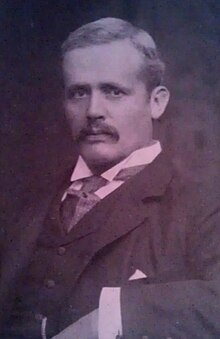James Rose Innes
|
The Right Honourable Sir James Rose Innes KCMG |
|
|---|---|
 |
|
| Chief Justice of South Africa | |
|
In office 1914–1927 |
|
| Preceded by | John Henry de Villiers |
| Succeeded by | William Henry Solomon |
| Judge of the Appellate Division | |
|
In office 1910–1927 |
|
| Chief Justice of the Transvaal Supreme Court | |
|
In office 1902–1910 |
|
| Member of the Cape Parliament | |
|
In office 1884–1902 |
|
| Constituency | Victoria East Cape Town |
| Attorney-General of the Cape Colony | |
|
In office 1900–1902 |
|
| Prime Minister | Gordon Sprigg |
| Governor |
Lord Milner Walter Hely-Hutchinson |
| Preceded by | Richard Solomon |
| Succeeded by | Thomas Graham |
|
In office 1890–1893 |
|
| Prime Minister | Cecil Rhodes |
| Governor | Henry Brougham Loch |
| Succeeded by | W. P. Schreiner |
| Personal details | |
| Born | 8 January 1855 Grahamstown |
| Died | 16 January 1942 (aged 87) Kenilworth, Cape Town |
| Nationality | South African |
| Spouse(s) | Jessie Dods Pringle |
| Children | Dorothy von Moltke |
| Alma mater |
Gill College Cape University |
| Profession | Barrister |
Sir James Rose Innes, KCMG PC (8 January 1855 – 16 January 1942) was the Chief Justice of South Africa from 1914 to 1927 and, in the view of many, its greatest ever judge. Before becoming a judge he was a member of the Cape Parliament, the Cape Colony's Attorney-General, and a prominent critic of Cecil John Rhodes.
Innes was born in Grahamstown in 1855. His father was James Rose Innes CMG, the Cape Colony's Under-Secretary for Native Affairs, whose own father had emigrated to the Cape from Scotland in 1822 and become its first Superintendent-General of Education. His mother was Mary Anne Fleischer, sister-in-law to Gordon Sprigg and granddaughter to Robert Hart of Glen Avon, the founder of Somerset East, who had landed at the Cape as a member of the British expeditionary force in 1795. Though always sanguine about maintaining imperial ties, Innes was proud of his deep roots at the Cape and considered himself as much a South African as its Dutch-speaking residents:
"I should call myself an Afrikaner, were it not for the tendency to confine that term to those whose ancestors landed here before the British occupation, and to such newer arrivals as are animated by the 'South African spirit'. I have neither Voortrekker nor Huguenot blood in my veins, and 'the South African spirit', as understood by those who extol it, implies a view on the native question which I cannot share. But I am proud to be a South African, and I claim to stand on the same national footing as if my forebears had landed with Van Riebeeck or followed Piet Retief over the Drakensberg."
...
Wikipedia
